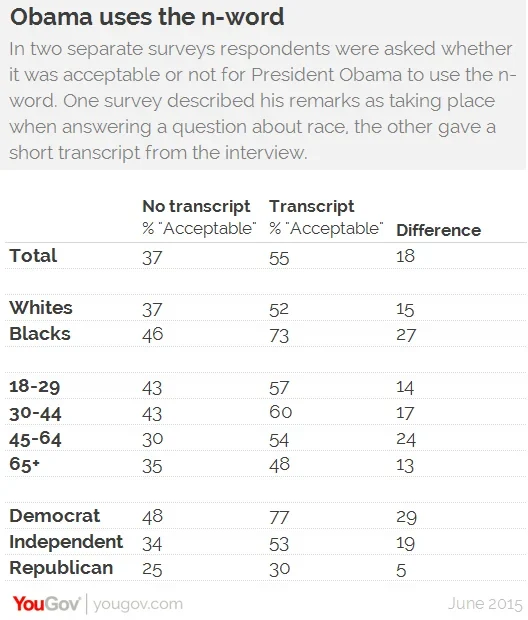When asked in theory, most people criticize President Obama for his use of the 'n-word’, but given the context most people think it was acceptable
Two weeks ago, before a debate over the Confederate flag and several momentous Supreme Court judgements stole the public’s attention, the media was briefly caught up in a controversy over a single word spoken by the president in an interview for a popular podcast called WTF. Some headlines: “Obama uses N-word, says we are ‘not cured’ of racism” “Making a Point, Obama Invokes a Painful Slur”. There were critics: one commentator said it made Obama the “rapper-in-chief” and another called it “beneath the office of the president” – but also those who called his use of the word “appropriate” and his wider remarks “right”.
Which camp is more representative of the public at large? According to an experiment YouGov conducted over the past week – it's all about how much information people are given before being asked to judge.
In the experiment two samples of 1000 US adults, each sampled and weighted to be nationally representative, were given two different questionnaires on consecutive days. The first group were asked about the use of the n-word by different groups – white people, black people, rappers – and then asked the following question:
“Do you think it is acceptable or unacceptable that President Obama used the n-word during an interview when he answered a question about race?”
The responses leaned clearly in one direction. 51% said it was unacceptable, against just 37% who said it was acceptable. Most republicans and independents were opposed, but even groups usually sympathetic to the president, like Democrats (48% acceptable to 41% unacceptable) and young people (43%-36%) were split. Blacks were divided 46% to 46%.
The second group of respondents were given the full quote with no preceding questions:
“Below is a transcript of something President Obama said in a recent radio interview after being asked about race relations in America.
“I always tell young people in particular, do not say that nothing’s changed when it comes to race in America unless you lived through being a black man in the 1950s, or ’60s, or ’70s. What is also true is that the legacy of slavery, Jim Crow, discrimination in almost every institution of our lives: that casts a long shadow. And that’s still part of our DNA. That’s passed on. We’re not cured of it—racism. We’re not cured of it. And it’s not just a matter of it not being polite to say n----r in public.”
Do you think it is acceptable or unacceptable for President Obama to use the n-word in this way?”
The responses showed the opposite of the previous survey. 55% said it was acceptable for Obama to use the n-word, while only 29% said it was unacceptable. Now, 77% of Democrats approved, along with 53% of independents and 57% of 19-29 year olds. At 73% to 10% blacks were now among the most understanding. (Notably, Republicans were among the least affected by the new context: 25% found the paraphrasing acceptable compared to 30% for the full quote. When political partisanship is involved, context makes less difference).

What’s more, 51% of Americans also said they agreed with the remarks, including 30% who agreed strongly. 37% disagreed. The only groups to disagree by a majority were Republicans and respondents over 65 years of age.
The research is a reminder of the importance for readers and media outlets to get “beyond the headline” to the full context. Whether or not a news outlet provided a full transcript of Obama’s remarks will likely have had a major impact on viewers’ impressions.
Image: Pete Souza / White House
See the full poll results here and here. Topline questionnaires with margin of error here and here.








